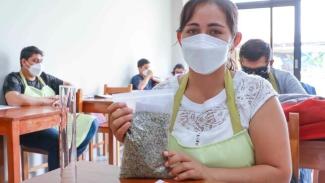Building capacity on quality of coffee and cocoa in Peru
San Martin is the first national cocoa exporting region and the third coffee exporting region of Peru that has been also receiving support of UNIDO, through its Global Quality and Standards Programme in Peru, to improve the quality of Peruvian coffee and cocoa to boost its exports by strengthening the services of the Quality Infrastructure, supporting the adoption of standards by the private sector, and promoting a culture of quality.
Between November and April 2022, seven training in 26 comprehensive sessions on physical and sensory analysis of Peruvian coffee and cocoa were held in San Martin. 163 Peruvian specialists have been trained in more than 100 hours with the aim of strengthening the technical knowledge in the country and increasing the quality of these products to make them more competitive in foreign markets. Through the creation of these capacities, the project is benefiting cooperatives, technicians, and producers.
The training sessions were carried out in hybrid modality, with virtual and face-to face- training that were conducted in the San Martin region in cities such as Tarapoto, Juanjuí, Tocache, Rioja, among others. The programme consists of two stages, the first part strengthened capacities in physical analysis, and the second in sensory analysis, the latter being subdivided into three modules: basic, intermediate, and advanced. These series of events were organized with the support of the San Martin Regional Government, local cooperatives, and other private and public institutions.
This capacity-building programme sought to benefit coffee and cocoa professionals by raising awareness and instructing them on the importance of using physical and sensory analysis to ensure and promote the increase in quality of these products in competitive markets, such as the United States and Europe.
The GQSP Peru is implemented by UNIDO in co-management with the Peruvian National Quality Institute (INACAL) and it is funded by Switzerland through its State Secretariat for Economic Affairs (SECO).
For further information contact Juan Pablo Davila (j.davila [at] unido.org (j[dot]davila[at]unido[dot]org))

